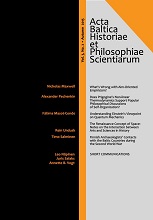Does Prigogine’s Non-linear Thermodynamics Support Popular Philosophical Discussions of Self-Organization?
Does Prigogine’s Non-linear Thermodynamics Support Popular Philosophical Discussions of Self-Organization?
Author(s): Alexander PechenkinSubject(s): Epistemology, Philosophy of Science
Published by: Tallinna Tehnikaülikooli õiguse instituut
Keywords: dissipative structure; extrapolation; non-linear thermodynamics; self-organization; Weltanschauung philosophy;
Summary/Abstract: The article is concerned with the philosophical talks which became popular in the 1980s and have kept their popularity till now–the philosophical essays about self-organization. The author attempts to find out as to which extent are these essays founded on the scientific theory to which they regularly refer, that is, Ilya Prigogine’s non-linear thermodynamics. The author insists that the equivalent of self-organization in Prigogine’s theoretical physics is the concept of dissipative structure. The concept of selforganization, as it is used in philosophical literature, presupposes a sequence of extrapolations, the first extrapolation being conducted by Prigogine and his coauthors. They became to use the concept of dissipative structure beyond the rigorous theory of this phenomenon. The subsequent step was that the scientific term “dissipative structure” was replaced by the vague concept “self-organization” in many popular and semi-popular books and papers. The author also emphasizes that by placing the concept of self-organization into the framework of philosophical concepts (the picture of the world, the ideals of scientific thought, the contemporary scientific revolution, etc.) a philosopher conducts the extrapolation of extrapolation and comes to a kind of what Edmund Husserl called Weltanschauung (‘worldview’) philosophy.
Journal: Acta Baltica Historiae et Philosophiae Scientiarum
- Issue Year: 3/2015
- Issue No: 2
- Page Range: 32-52
- Page Count: 21
- Language: English

